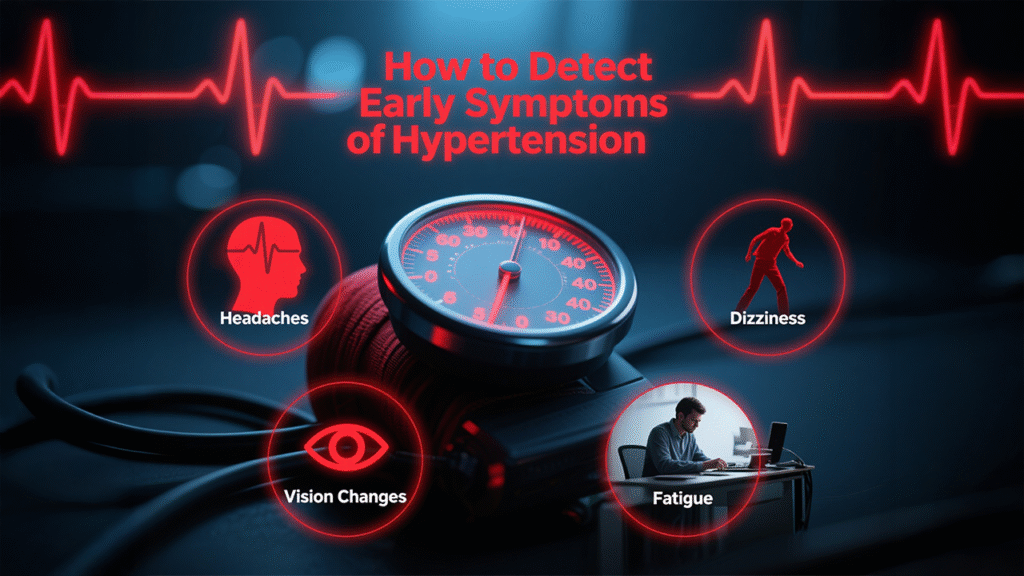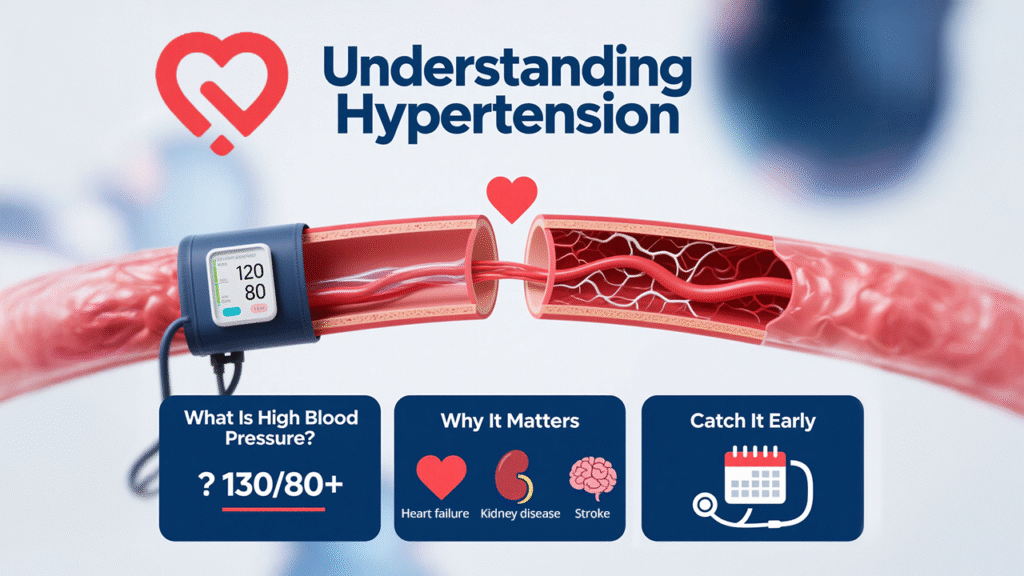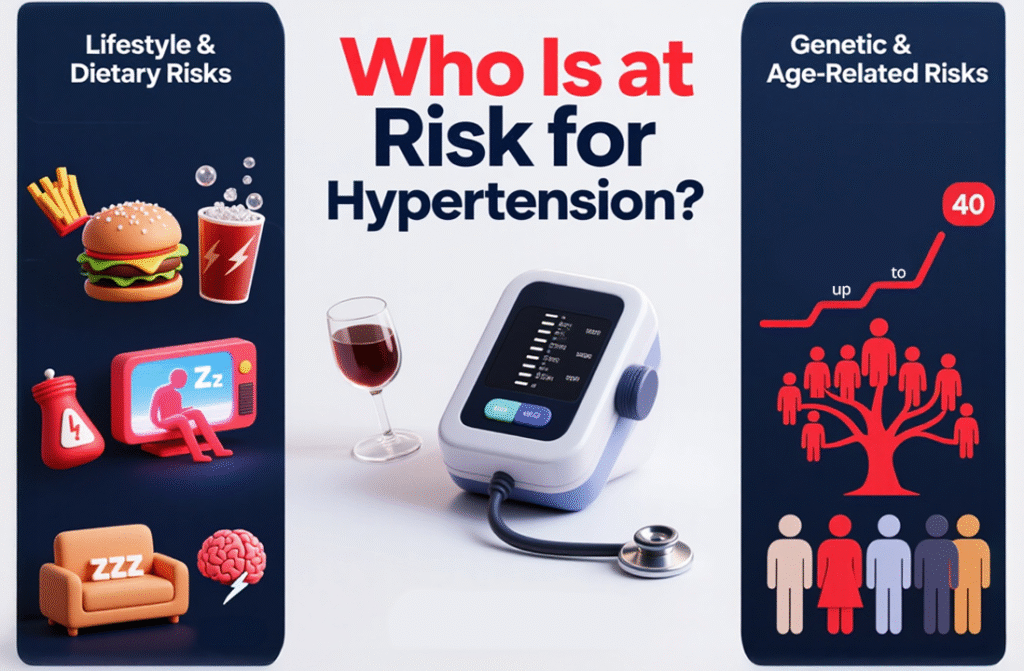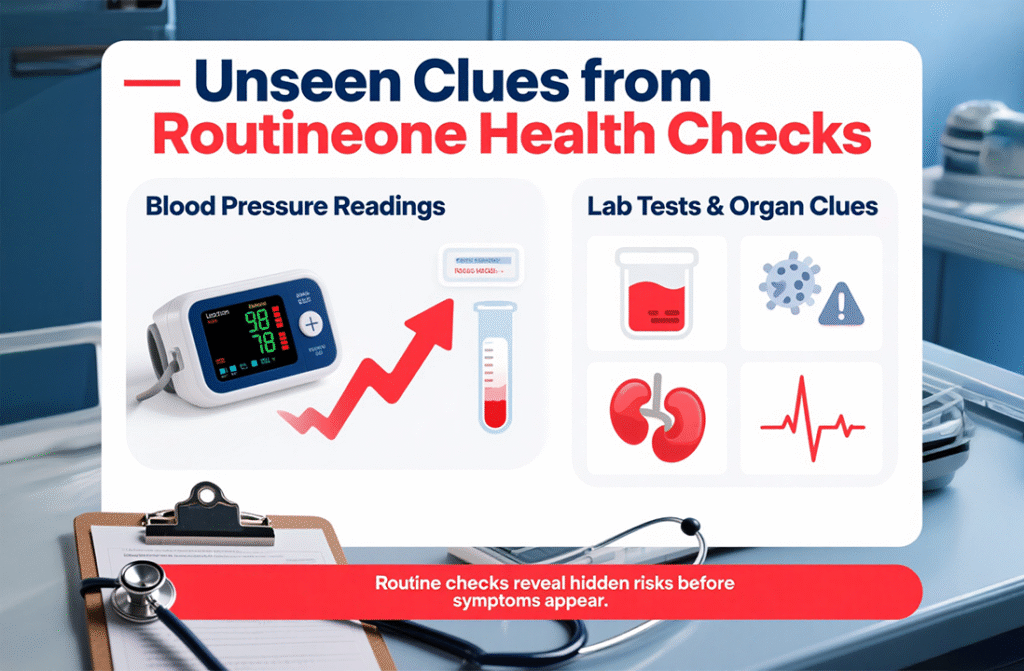How to Detect Early Symptoms of Hypertension

High blood pressure, or hypertension, is often called the “silent killer” for a reason — it can do serious damage to your heart, kidneys, and brain long before any noticeable signs appear. But here is the thing: if you pay close attention to your body and health habits, you can spot the early warnings before things get worse. This article will walk you through a practical, step-by-step guide on how to detect early symptoms of hypertension and take control of your health before it takes control of you.
Understanding Hypertension

What Is High Blood Pressure?
Think of your blood vessels like a garden hose. When water flows at normal pressure, the hose remains fine. But when the pressure increases, the hose becomes stressed, stiff, and eventually, it may burst. Similarly, hypertension occurs when the force of your blood against artery walls is too high consistently, forcing your heart to work harder.
A normal blood pressure reading is around 120/80 mmHg. Anything consistently over 130/80 mmHg could be a red flag, especially if left untreated. Hypertension is classified into different stages, and catching it early is key to preventing long-term damage.
Why Early Detection Matters
Waiting for obvious symptoms could be a dangerous gamble. Early detection lets you make lifestyle adjustments and seek treatment before hypertension progresses to cause heart failure, kidney disease, or stroke. The earlier you identify the risk, the higher your chance of avoiding serious complications.
Who Is at Risk for Hypertension?

Lifestyle and Dietary Factors
If your daily routine involves salty takeout meals, lots of screen time, sugary drinks, and little to no physical activity, you are setting the stage for hypertension. High sodium intake, stress, and alcohol consumption can also push your blood pressure to dangerous levels.
Genetic and Age-related Risk
Your age and family history matter. Individuals over 40, or those with parents or siblings who have high blood pressure, are more likely to develop it themselves. Ethnic background may also influence your risk. That is why getting regular checkups, especially if you fall into any of these categories, is essential.
Early Physical Symptoms You Should Not Ignore
Although many people with hypertension experience no symptoms, some early warning signs may emerge. Here are the most important ones to keep an eye on.
· Persistent Headaches
Do you frequently wake up with a dull, pounding headache? While headaches can be caused by various issues, chronic ones may indicate that your blood pressure is rising beyond healthy limits.
· Vision Problems or Blurred Sight
High blood pressure can damage the tiny blood vessels in your eyes, leading to blurred vision, floaters, or even sudden vision loss. If your sight starts changing for no clear reason, consult a doctor immediately.
· Chest Discomfort or Palpitations
While these symptoms are commonly associated with heart attacks, they can also signal elevated blood pressure. If your heart feels like it is skipping a beat, racing, or pounding out of your chest, you should not ignore it.
· Shortness of Breath During Mild Activity
Do you feel winded after climbing stairs or walking a short distance? High blood pressure can reduce your heart’s efficiency, leading to fatigue and breathlessness even during simple activities.
Unseen Clues from Routine Health Checks

Blood Pressure Readings
The simplest and most accurate way to detect hypertension early is by regularly checking your blood pressure. A sudden increase in your usual reading, even without symptoms, can be a warning sign. At Northern Heart Hospital, professional screening and monitoring services can help you stay on top of your numbers.
Lab Tests and Organ Clues
Routine blood and urine tests may reveal damage to your kidneys or elevated cholesterol, which often accompanies high blood pressure. An abnormal ECG (electrocardiogram) may also suggest that your heart is under pressure.
How to Monitor Your Blood Pressure at Home
Home monitoring is more accessible than ever with digital monitors. Choose an upper-arm cuff for best accuracy and keep a record of your daily readings. Measure at the same time each day, ideally in the morning before breakfast or in the evening, after resting.
Make sure you are seated with your back supported, feet flat on the floor, and your arm resting at heart level. Avoid caffeine or smoking 30 minutes before checking your pressure.
When to See a Doctor
If you experience any of the symptoms above or your home readings remain elevated over a week, it is time to consult a specialist. Visit Northern Heart Hospital for a comprehensive cardiovascular evaluation. They offer early detection packages tailored to high-risk patients and those experiencing early warning signs.
Diagnosing Hypertension Early at Northern Heart Hospital
At nhearthospital.com, patients have access to state-of-the-art diagnostic tools, including 24-hour ambulatory blood pressure monitoring, cardiac imaging, kidney function panels, and more. Their team of expert cardiologists works with you to catch high blood pressure in its earliest form and develop a personalized care plan to prevent complications.
Lifestyle Changes that Support Early Detection and Prevention
Prevention is always better than cure — especially when it comes to high blood pressure. Start by reducing your salt intake, increasing physical activity (at least 30 minutes most days), quitting smoking, and moderating alcohol consumption.
Stress management is just as critical. Try meditation, yoga, or even a daily walk. Incorporating foods rich in potassium, magnesium, and fiber — such as bananas, leafy greens, oats, and beans — can naturally lower your blood pressure. Northern Heart Hospital also offers dietary and lifestyle counseling through their integrated care teams.
Final Thoughts
Hypertension may creep in quietly, but with the right knowledge and vigilance, you can catch it before it catches up with your health. By paying attention to your symptoms, monitoring your blood pressure regularly, and partnering with experts at nhearthospital.com, you can stay one step ahead. Take the time to listen to your body — your future self will thank you.
Frequently Asked Questions (FAQs)
1. Can hypertension cause symptoms even if my blood pressure seems normal sometimes?
Yes, hypertension can fluctuate, and early organ damage may begin even before blood pressure consistently reads high. That is why regular monitoring is important.
2. How often should I get my blood pressure checked if I feel healthy?
At least once a year for healthy adults. More frequently if you are over 40, overweight, or have a family history of heart disease.
3. Are smartwatches accurate for monitoring blood pressure?
While convenient, they are not as reliable as medical-grade monitors. Use them for trends, but confirm with a cuff-style device or clinic checkup.
4. Can children or teens have high blood pressure too?
Yes, especially with rising obesity rates. Pediatric hypertension is real and should be taken seriously with regular screenings for at-risk children.
5. Is it true that herbal remedies can lower blood pressure?
Some, like garlic or hibiscus tea, may help, but always consult your doctor before using herbs, especially if you are already on medication.
